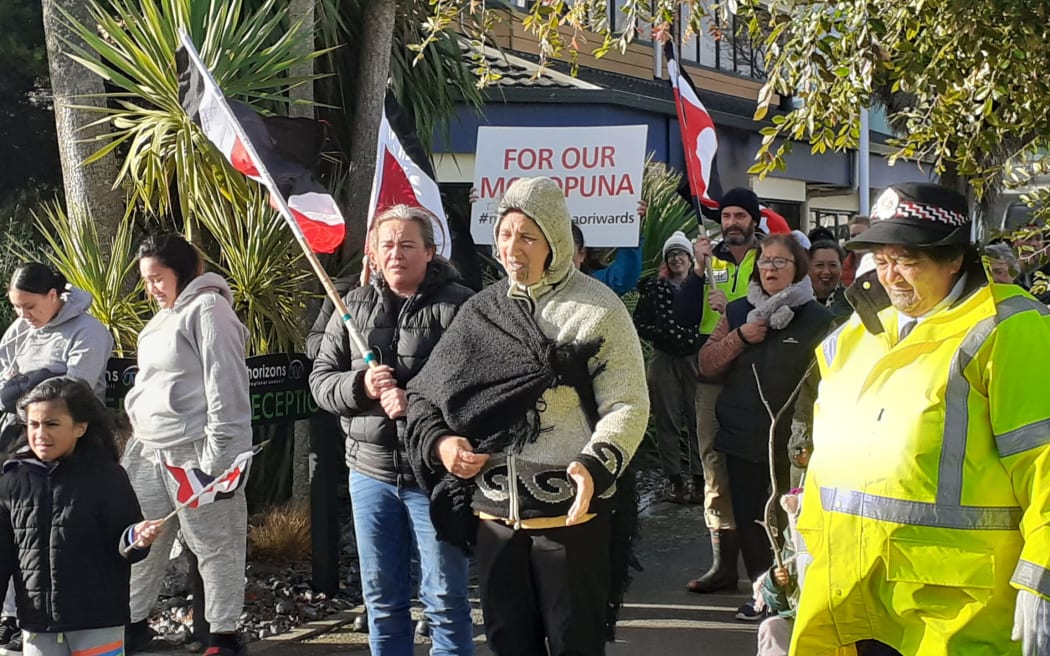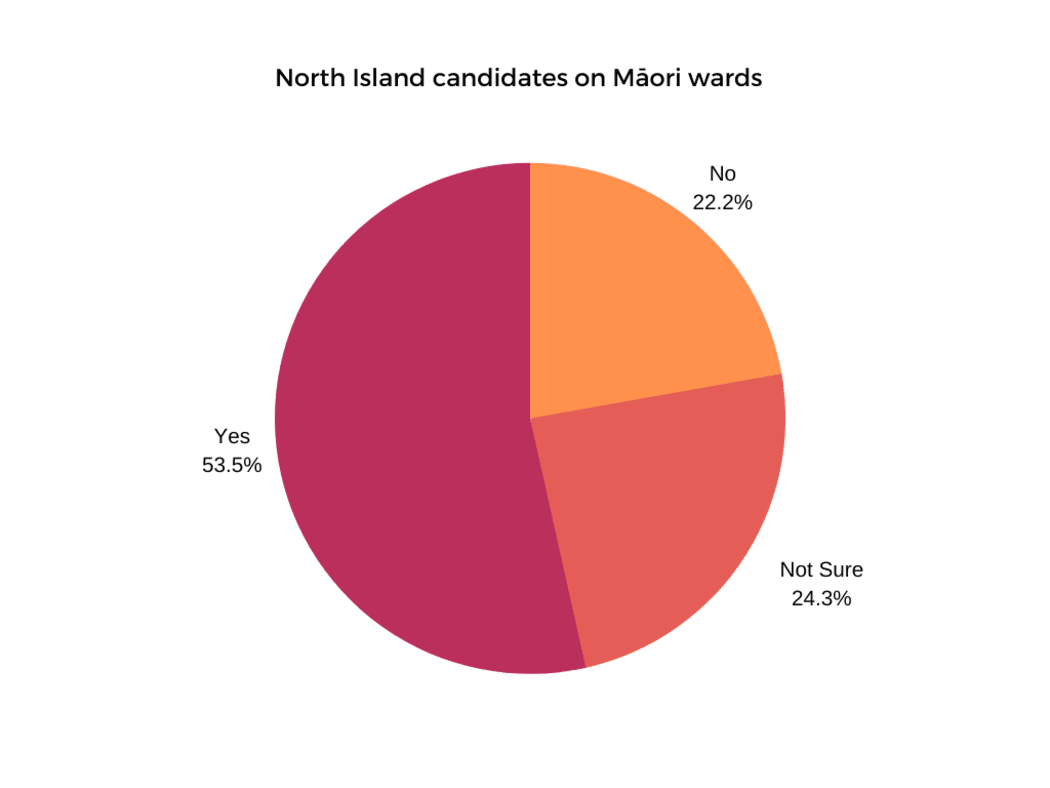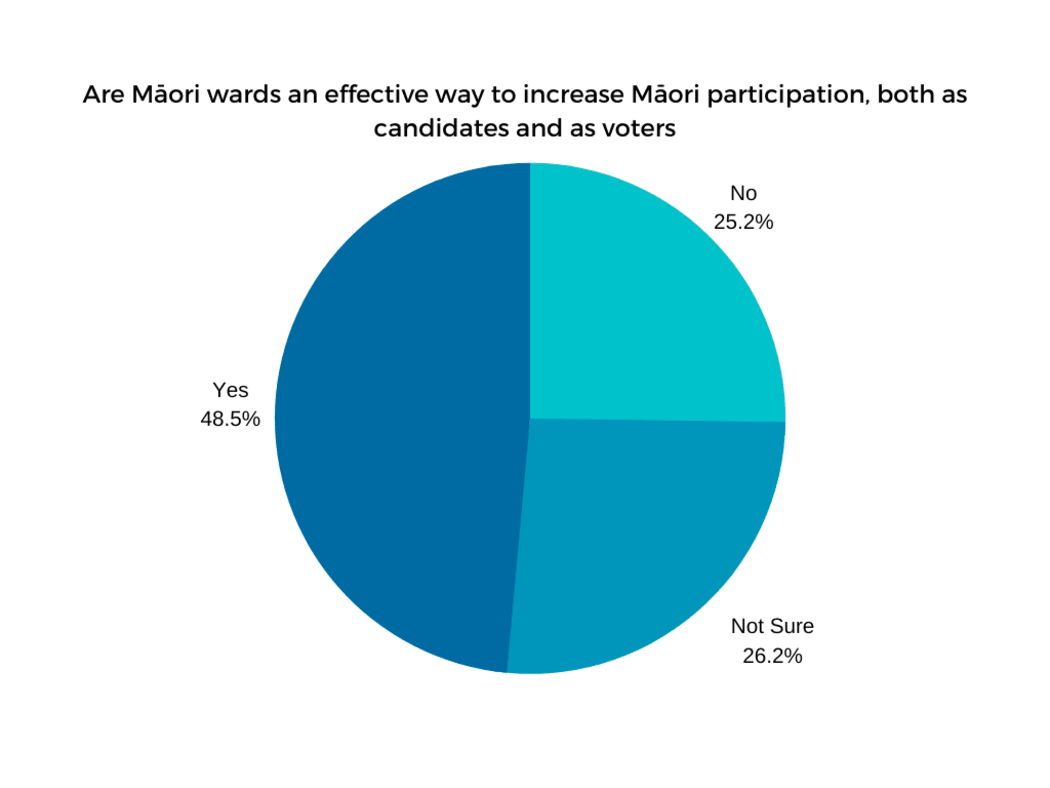
Hīkoi in support of Māori wards held in Palmerston North. Photo: LDR / Moana Ellis
Mayoral hopefuls in Ruapehu and Rangitīkei are overwhelmingly in support of Māori wards but the three Whanganui contenders are divided, according to a new survey canvassing all 291 mayoral candidates in New Zealand.
In a first of its kind, Local Democracy Reporting’s 14 journalists across Aotearoa canvassed the candidates for the country’s 67 mayoralties to find out where they stand on key local government issues.
Just over half of councils (34) are introducing Māori wards in October, many for the first time. When asked if they were an effective way to increase Māori participation nearly half of the mayoral contenders (48.5 percent) said they were.
A quarter (26.2 percent) were not sure and 25.2 percent rejected the proposition outright.
In Ruapehu, which is introducing three Māori ward seats this year, candidates Adie Doyle, Fiona Kahukura Hadley-Chase, Weston Kirton and Elijah Pue agreed that Māori wards would increase Māori participation.
“That is why I voted for them. They help fulfil council’s obligations under Section 81 of the Local Government Act 2002, providing opportunities for Māori to contribute to the decision-making process,” Doyle told the 2022 Local Democracy Reporting mayoral candidate survey.

Local Democracy Reporting has canvassed the candidates for the country’s 67 mayoralties to find out where they stand on Māori wards. Photo: LDR
Kirton said Māori wards were a positive change for Māori representation at the council table. However, all councillors were there to represent the district as a whole.
“If we are to have Māori representation at council that is open, democratic and inclusive of all our iwi and hapū, then we need include the [Ruapehu District] Māori Council as a standing committee,” Kirton said.
Pue, one of two sitting councillors who are Māori elected to general seats, told Local Democracy Reporting that Māori wards would increase Māori representation – “and enhance decision making by ensuring we consider Māori in decisions we make”.

Hadley-Chase said the act of introducing Māori seats alone had increased Māori participation.
“It certainly has worked as more Māori have nominated for council than ever before and I am certain Māori voters will do the same. Māori wards are only one way councils can give leverage to Māori participation, however – there is more work that needs to be done.”
In Rangitīkei, only two of the district’s four mayoral candidates responded to the survey. Incumbent mayor Andy Watson and Simon Loudon both support the advent of Māori seats. Two Māori wards with one seat each are being introduced by Rangitīkei District Council this year.
“Iwi being present at the council table is significant. It is important to include our whole community. I believe we need open dialogue and more understanding of different viewpoints within our district,” Loudon said.
Whanganui District Council is not among the host of councils introducing Māori seats. Incumbent mayor Hamish McDouall said he was not sure if they would increase Māori participation.
“This is entirely dependent on tangata whenua in each rohe. Whanganui iwi are seeking a different working relationship with council – something that can demonstrate the Treaty partnership more fully than Māori wards. However, we need the Māori world view at the decision-making table,” McDouall said.
Mayoral challenger Andrew Tripe said he believed Māori wards were not the preferred option of Whanganui iwi.
“Their wish is to be engaged in consultation at the start of any process. Under my mayoralty, I will discuss and agree with iwi on how they engage early as part of the consultation process. There is an absolute need for Māori to be at the council table – no doubt. The reality is that Māori wards shouldn’t be necessary if Māori stepped up to be candidates for council and were around the table.”
In the previous election, Māori candidates stood for Ruapehu, Rangitīkei and Whanganui district councils. Two were elected in Ruapehu and three in Rangitīkei. None of the multiple Māori candidates who stood in Whanganui were elected.

Local Democracy Reporting has canvassed the candidates for the country’s 67 mayoralties to find out where they stand on Māori wards. Photo: LDR
DC Harding, the youngest of the three Whanganui mayoral contenders – and the only Māori – was adamant Māori views should be in the council chamber.
“Māori wards play a pivotal role in ensuring that Māori aspirations are at the table 100 percent of the time. Only Māori should vote on what Māori need.”
In South Taranaki, incumbent mayor Phil Nixon said the decision to introduce two Māori wards in the district was already having an impact.
“We are already seeing a lot more Māori participation in Vote 2022 than we have seen in the past.”
In neighbouring Stratford District Council, incumbent mayor Neil Volzke was more circumspect.
“Only time will tell the answer to this question. Māori Wards will provide the opportunity for improved participation in decision making, which is a clear requirement of the Local Government Act. Collectively, with the rural and urban wards, it’s an attempt to ensure all sectors of the community are represented.”
Bonita Bigham, chair of Te Maruata, LGNZ’s national collective of Māori elected or appointed to local government, said the introduction of Māori wards had clearly empowered more Māori to stand.
“It’s going to be a different sector. We will now have at least half of the councils across the country with Māori wards. It will be a different place, but the sector is ready for that,” Bigham said.
“The conversations have been changing, the attitudes have been changing. Of course, there are those who still find this whole process challenging and frightening but generally we’ve got a lot of great friends and lobbyists and tangata tiriti who see this as the best way forward for the motu and we’re excited to have all these Māori members coming in.”
Māori elected to the council table were not there to replace direct relationships between iwi, hapū and councils, now a requirement under many Treaty Settlements, Bigham said.
“We’re really clear as Māori elected members in the sector that we’re not there to speak for iwi, we’re not there to speak for hapū. We are there to provide a Te Ao Māori perspective and our lived experience of being Māori in our communities,” Bigham said.
“But for our Māori-appointed members who sit on things like council committees, our iwi appointees, that’s their space.
“We’re just excited about the increased numbers, the increased potential for better governance decisions to be made because of that increased Māori perspective at the table.”
The survey was sent out to all 291 mayoral candidates and garnered 202 responses, representing a 69 percent response rate.
Local Democracy Reporting is Public Interest Journalism funded through NZ On Air